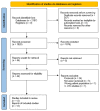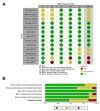Effect of Probiotics in Breast Cancer: A Systematic Review and Meta-Analysis
- PMID: 36829557
- PMCID: PMC10004677
- DOI: 10.3390/biology12020280
Effect of Probiotics in Breast Cancer: A Systematic Review and Meta-Analysis
Abstract
Probiotics may have the potential to protect against breast cancer, partly through systemic immunomodulatory action and active impact upon intestinal microbiota. Given a few clinical studies on their curative role, we conducted a systematic review of the potential effects of probiotics in breast cancer patients and survivors of breast cancer, aiming to support further clinical studies. A literature search was performed using PubMed, Embase, and the CENTRAL databases from inception through to March 2022. A total of eight randomized clinical trials were identified from thirteen articles published between 2004 and 2022. We evaluated quality-of-life measures, observed bacterial species and diversity indices, probiotic-related metabolites, inflammatory biomarkers, and other responses in breast cancer patients and survivors. Results were synthesized qualitatively and quantitatively using random-effects meta-analysis. Different probiotics supplements utilized included Lactobacillus species alone (Lacto), with or without estriol; probiotic combinations of Lactobacillus with Bifidobacterium (ProLB), with or without prebiotic fructooligosaccharides (FOS); ProLB plus Streptococcus and FOS (ProLBS + FOS); and ProLB plus Enterococcus (ProLBE). We found that use of ProLBS with FOS in breast cancer patients and use of ProLBE in survivors of breast cancer show potential benefits in countering obesity and dyslipidemia. ProLBS with FOS use decreases pro-inflammatory TNF-α in breast cancer survivors and improves quality of life in those with breast-cancer-associated lymphedema. Supplementing probiotics capsules (109 CFU) with a prebiotic and using an intake duration of 10 weeks could provide a better approach than probiotics alone.
Keywords: breast cancer; cytokines; metabolites; prebiotics; probiotics.
Conflict of interest statement
The authors declare no conflict of interest.
Figures










Similar articles
-
The Use of Prebiotic and Probiotic Interventions for Treating Gastrointestinal and Psychosocial Health Symptoms in Cancer Patients and Survivors: A Systematic Review.Integr Cancer Ther. 2021 Jan-Dec;20:15347354211061733. doi: 10.1177/15347354211061733. Integr Cancer Ther. 2021. PMID: 34844479 Free PMC article.
-
Probiotics to prevent infantile colic.Cochrane Database Syst Rev. 2019 Mar 13;3(3):CD012473. doi: 10.1002/14651858.CD012473.pub2. Cochrane Database Syst Rev. 2019. PMID: 30865287 Free PMC article.
-
The Impact of Probiotics, Prebiotics, and Synbiotics during Pregnancy or Lactation on the Intestinal Microbiota of Children Born by Cesarean Section: A Systematic Review.Nutrients. 2022 Jan 14;14(2):341. doi: 10.3390/nu14020341. Nutrients. 2022. PMID: 35057522 Free PMC article.
-
The use of probiotics and prebiotics can enable the ingestion of dairy products by lactose intolerant individuals.Clin Nutr. 2022 Dec;41(12):2644-2650. doi: 10.1016/j.clnu.2022.10.003. Epub 2022 Oct 12. Clin Nutr. 2022. PMID: 36308983
-
Effects of probiotics, prebiotics, and synbiotics on polycystic ovary syndrome: a systematic review and meta-analysis.Crit Rev Food Sci Nutr. 2023;63(4):522-538. doi: 10.1080/10408398.2021.1951155. Epub 2021 Jul 21. Crit Rev Food Sci Nutr. 2023. PMID: 34287081
Cited by
-
Guideline for designing microbiome studies in neoplastic diseases.Geroscience. 2024 Oct;46(5):4037-4057. doi: 10.1007/s11357-024-01255-4. Epub 2024 Jun 26. Geroscience. 2024. PMID: 38922379 Free PMC article. Review.
-
Anticancer Potential of Postbiotic Derived from Lactobacillus brevis and Lactobacillus casei: In vitro Analysis of Breast Cancer Cell Line.Probiotics Antimicrob Proteins. 2024 May 17. doi: 10.1007/s12602-024-10288-2. Online ahead of print. Probiotics Antimicrob Proteins. 2024. PMID: 38758482
-
Bibliometric analysis of global research trends between gut microbiota and breast cancer: from 2013 to 2023.Front Microbiol. 2024 Jul 31;15:1393422. doi: 10.3389/fmicb.2024.1393422. eCollection 2024. Front Microbiol. 2024. PMID: 39144230 Free PMC article.
-
The oral-gut microbiome axis in breast cancer: from basic research to therapeutic applications.Front Cell Infect Microbiol. 2024 Nov 21;14:1413266. doi: 10.3389/fcimb.2024.1413266. eCollection 2024. Front Cell Infect Microbiol. 2024. PMID: 39639864 Free PMC article. Review.
-
Nutrition Intervention and Microbiome Modulation in the Management of Breast Cancer.Nutrients. 2024 Aug 10;16(16):2644. doi: 10.3390/nu16162644. Nutrients. 2024. PMID: 39203781 Free PMC article. Review.
References
-
- WHO. FAO Probiotics in Food: FAO Food and Nutrition Paper. 2006. [(accessed on 3 March 2022)]. Available online: https://www.fao.org/3/a0512e/a0512e.pdf.
Publication types
LinkOut - more resources
Full Text Sources

